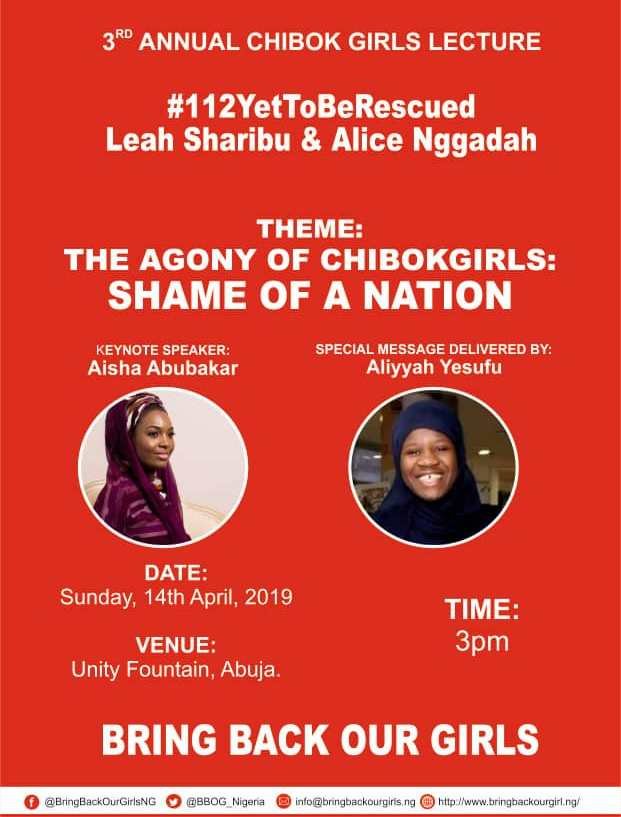The Story of Chibok Girls Goes on Stage in the United States

The humiliating story of abduction of over 200 school girls from a secondary school in Chibok, Borno State of Nigeria in April 2014 without any firefight or hot pursuit by any Nigerian security agency has been told and retold. But now, the stage is telling it in its own way and in the United States, partly because it is a story nobody wants told in Nigeria, claims one of the mastermind. This piece extracted from The Washington Post, (www.washingtonpost.com/entertainment/theater_dance/nobody-wants-this-story-told-nigerias-renegade-theatre-makes-us-debut-with-chibok-girls/2019/05/08) tells us about the premiere. It was originally titled “The Chibok Girls: Our Story”, a May 8th, 2019 piece. The Washington Post added: The Chibok Girls: Our Story, written and directed by Wole Oguntokun. Through Thursday at Georgetown University’s Gonda Theatre, 37th and O streets NW. $20. globallab.georgetown.edu.

The author
The atrocity of Boko Haram’s kidnapping of Nigerian schoolgirls is described with piercing clarity in “The Chibok Girls: Our Story,” which is getting a brief U.S. premiere this week at Georgetown University. The four women of Nigeria’s Renegade Theatre perform monologues and scenes drawn from interviews with survivors; apparently as the play was being developed, it was the survivors who comforted the actors in the rehearsal room.
“I never want to stop telling their story,” two of the cast members said during a post-show discussion Tuesday night.
“The Chibok Girls” is the central performance of the arts-and-politics conference (through Saturday) dubbed the Gathering, the endpoint of the CrossCurrents festival that Georgetown’s Lab for Global Performance and Politics hopes to make a biennial event. Washington is an ideal locale for this intersection. Panelists and performers this week include former secretary of state Madeleine Albright; performer Kathleen Chalfant and writer-performer Heather Raffo; Pulitzer Prize-winning playwright Martyna Majok; artistic directors Maria Manuela Goyanes of Woolly Mammoth Theatre and Stephanie Ybarra of Baltimore Center Stage; and writer-performer Pascale Armand with a staged reading from her “$#!thole Country Clapback.”
The panels and their “pop-up” performances are by invitation, but “Chibok Girls,” playing through Thursday, is open to the public. It got off to an august start, as Nobel Prize winner Wole Soyinka debuted excerpts from his new long-form epic poem, “A Humanist Ode for Chibok, Leah.” Soyinka — 84 and affectionately called “Prof,” for “Professor” — read in a deep voice that seemed to emanate from ancient rock. Fury at government corruption and raw cruelty drove him to a controlled crescendo over his five-minute selection, which brought the balm of reasoned language and outraged yet composed thought to the barbarity of the situation.

Ms Meg Otanwa, a dramatis personae

Kongi is involved
“I feel like the herald in a Greek play who brings the bad news,” Soyinka said as he began.
That led directly to “Chibok Girls,” a roughly 80-minute piece of testimonial theater that writer-director Wole Oguntokun built from interviews and news reports, an effort that has earned him death threats.
“Nobody wants this story told,” Oguntokun said from the stage after the show. “Sometimes we tell the truth and run.”
“Chibok Girls” is an entirely unembellished production: The only set is a simple backdrop with photos and headlines. Lily Byoma, Tobi Igbenoba, Jennifer Osammor and Meg Otanwa perform in black leotards and simple tops, with rare costume changes that in one case includes a military uniform. The scenes and monologues are often propelled by a percussionist onstage; the company’s drummer couldn’t get a visa, so at the last minute the locally based Dolapo Kodaolu stepped in.
Oguntokun’s monologues are each based on a specific incident, and it becomes painfully vivid what it was like to be in school, then to be at gunpoint with “not real soldiers” firing in front of and behind the students, what it felt like to be captured in a truck and to jump out, running terrified through the night. Another escape feels like a different kind of miracle as a woman dares to put her hand on a gunman’s rifle, saying, “Let us not kill tonight.” Somehow, that worked.
The culture of abduction and trafficking begins to feel deep. The story spreads wide and takes on a variety of experiences as the performers address the audience directly, and the actors’ unflagging urgency is a striking conduit to the girls. As they say things such as “I do not sleep anymore, because I know they do not sleep,” the on-the-ground reality grows more and more clear.
The women of “The Chibok Girls” are armed with nothing but these testimonies, trusting that the detailed, alarming stories are enough to change hearts and minds. It’s a fitting centerpiece for a gathering on how artists can use the public platform of the stage to confront politics in the most powerful and even dangerous ways, especially when officials spin facts and warp reality. “If you don’t write it down,” Oguntokun explained of his playmaking impulse during the post-show Q&A, “things get distorted.”
Posted from my blog with SteemPress : https://intervention.ng/16033/
Congratulations @adepentane! You have completed the following achievement on the Steem blockchain and have been rewarded with new badge(s) :
You can view your badges on your Steem Board and compare to others on the Steem Ranking
If you no longer want to receive notifications, reply to this comment with the word
STOPDo not miss the last post from @steemitboard:
Vote for @Steemitboard as a witness to get one more award and increased upvotes!